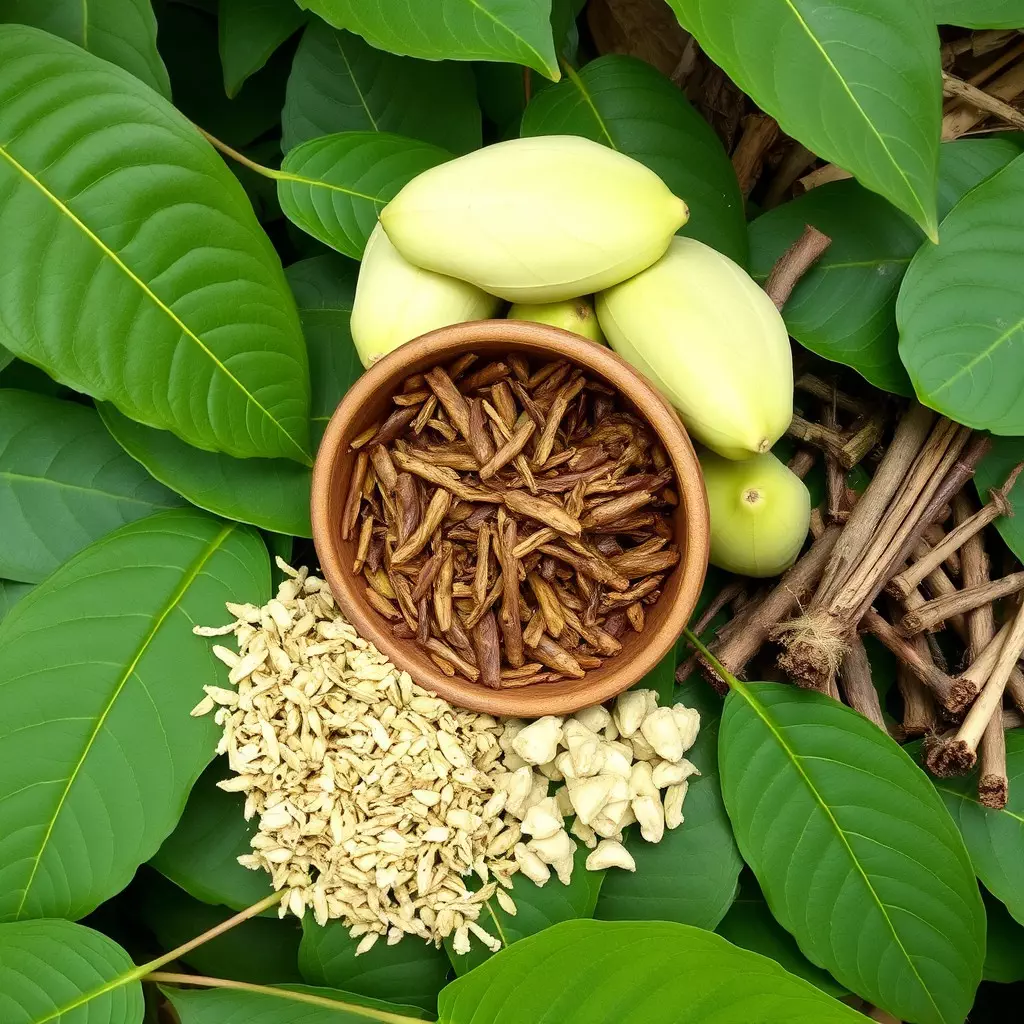Chronic Fatigue Syndrome (CFS) presents with severe fatigue that persists despite rest and affects multiple systems. Kratom, a plant from Southeast Asia containing alkaloids like mitragynine and 7-hydroxymitragynine, is being explored as a potential therapeutic for CFS due to its analgesic and anti-inflammatory properties, with some patients reporting improved fatigue and pain levels. However, the scientific community advises caution, emphasizing that kratom should only be used under medical supervision due to safety, efficacy, and dependency concerns. The regulatory status of kratom is inconsistent across regions, and its use as a treatment for CFS should be approached with informed decision-making and professional guidance. For those interested in discount kratom strains, it's important to start with a low dose, monitor personal tolerance, adhere to recommended dosing, and procure products from reputable suppliers to avoid contamination or adulteration. Engaging with healthcare providers is key for safe and responsible use of kratom within a CFS treatment plan.
Chronic fatigue syndrome (CFS) presents a complex challenge for individuals seeking relief from its debilitating symptoms. This article delves into the potential role of kratom, a botanical compound, in managing CFS. We’ll explore how kratom can fit into your treatment plan safely and effectively, considering its varied effects on well-being. From understanding the nature of CFS to examining the scientifically-backed benefits and cautions of using discount kratom, readers will gain insights into a natural approach to alleviating the fatigue associated with this condition. Join us as we navigate the intersection of herbal medicine and CFS management.
- Understanding Chronic Fatigue Syndrome (CFS) and the Role of Kratom in Management
- Safe Practices for Incorporating Discount Kratom into Your CFS Treatment Plan
- Exploring the Potential Benefits and Considerations of Using Kratom for CFS Symptoms
Understanding Chronic Fatigue Syndrome (CFS) and the Role of Kratom in Management

Chronic Fatigue Syndrome (CFS) is a complex and often debilitating condition characterized by profound fatigue that is not relieved by rest and affects multiple body systems, leading to a significantly reduced ability to engage in pre-disease activities. The etiology of CFS is not fully understood, and its management can be challenging due to its multifaceted nature. As such, individuals with CFS frequently seek complementary therapies that may alleviate their symptoms. Kratom, a tropical evergreen tree native to Southeast Asia, has gained attention for its potential role in the management of chronic conditions, including CFS. Kratom contains various alkaloids, such as mitragynine and 7-hydroxymitragynine, which are believed to interact with opioid receptors in the brain and spinal cord, potentially providing analgesic and anti-inflammatory effects. Some patients report that kratom helps manage their fatigue and pain, leading to an improved quality of life.
The use of kratom for CFS management should be approached with caution, as its efficacy and safety profiles are still subjects of ongoing research. While some users report positive outcomes from using kratom products like discount kratom strains, it is essential to consult healthcare professionals before incorporating kratom into any treatment regimen. This is particularly important given the potential for side effects and the risk of developing dependency or tolerance. Additionally, the regulatory status of kratom varies by region, with some areas imposing restrictions on its sale and use. Therefore, individuals interested in exploring kratom as a management option for CFS should do so within the framework of professional medical guidance to ensure safe and responsible use.
Safe Practices for Incorporating Discount Kratom into Your CFS Treatment Plan

When considering the integration of discount kratom into a chronic fatigue syndrome (CFS) management plan, it is imperative to approach its use with caution and informed decision-making. Kratom, a plant originating from Southeast Asia, has gained attention for its potential effects on energy levels and pain relief, which can be significant symptoms of CFS. To safely incorporate kratom into your treatment regimen, it is essential to start with a low dosage to assess individual tolerance and to consult with a healthcare provider beforehand. This ensures that the use of discount kratom complements other treatments rather than interferes with any medications you may be taking.
Moreover, consistency in dosing is key; avoid deviating from recommended guidelines without medical advice, as kratom’s effects can vary significantly between individuals. Monitor your body’s response to the supplement, focusing on changes in energy levels and overall well-being. It is also crucial to purchase kratom from reputable sources that offer discount kratom options while adhering to strict quality control standards to avoid contaminants or adulterated products. By following a cautious and well-informed approach, you can explore the potential benefits of kratom in managing CFS symptoms within a comprehensive treatment plan. Always prioritize open communication with your healthcare provider throughout this process to ensure the safest and most effective management of your condition.
Exploring the Potential Benefits and Considerations of Using Kratom for CFS Symptoms

Individuals grappling with Chronic Fatigue Syndrome (CFS) often explore various avenues for relief from their debilitating symptoms. Kratom, a botanical derivative from Southeast Asia, has emerged as a potential alternative treatment for CFS due to its complex pharmacological effects. Proponents suggest that kratom may offer symptomatic relief by modulating pain perception and enhancing mood, which are often compromised in CFS patients. Some users report that specific strains of kratom, like the Maeng Da or Bali varieties, provide sustained energy and alleviate fatigue without the jittery side effects associated with caffeine. Additionally, discount kratom sources offer a more economical approach to managing symptoms, making it an accessible option for those on limited budgets.
However, it is imperative to approach the use of kratom with caution. The substance’s interaction with neurotransmitters can lead to both beneficial and adverse effects. While some individuals may experience improvements in their CFS symptoms, others might encounter negative reactions, including gastrointestinal distress or dependency issues. The regulatory status of kratom varies by region, and its legal standing may influence the availability and quality of products. Moreover, individual responses to kratom can differ significantly, necessitating careful consideration and consultation with healthcare providers before integrating it into a CFS management plan. Users should prioritize sourcing high-quality, lab-tested kratom from reputable vendors to mitigate potential risks and optimize the chances of benefiting from its therapeutic properties.
In concluding our exploration into the management of Chronic Fatigue Syndrome (CFS) with kratom, it’s evident that while no single treatment is a universal cure for CFS, incorporating kratom into a comprehensive treatment plan may offer relief for some individuals. It is crucial to approach the use of discount kratom with careful consideration and adherence to safe practices to ensure its efficacy and safety. The potential benefits of kratom in managing CFS symptoms warrant further scientific investigation, particularly as an adjunct therapy. Patients should consult healthcare professionals before integrating kratom into their treatment regimen, given the unique nature of each person’s condition and the importance of personalized care. As our understanding of kratom’s effects on CFS deepens, it may become a valuable component in the multifaceted approach needed to address this complex disorder.






